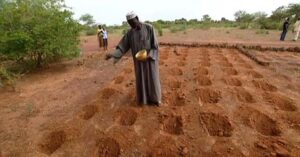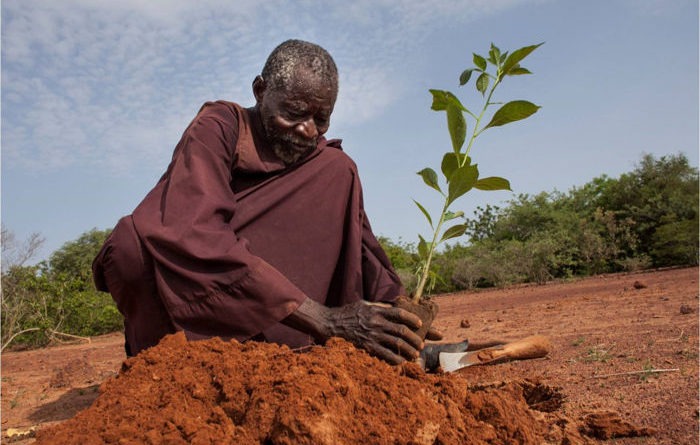Yacouba Sawadogo was born in 1946 in Yatenga, North Burkina Faso. A severe drought in the 1980s destroyed all green and reduced rainfall by 80% in the Sahel region, the vast transitioning area between the Sahara Desert and the savanna in Africa. Everyone in Yacouba’s village left the land and migrated southward. One “madman” according to the locals, stood behind and faced the scorching desert by himself. Yacouba didn’t know how to read and write; his only equipment was a shovel and a firm belief that everything could be changed. Without modern education and gadgets, Yacouba decided to reintroduce the ancient farming techniques of Zai.
Zai is a traditional plantation method from the Sahel. The practice consists of preparing holes during the long dry season in the Sahel. The holes store water during the rainy season to be used for farming. His innovative addition to this ancient tradition was filling the pits with manure and organic waste to create fertile conditions for termites. The termites feed on the waste and dig tunnels deep under each hole in the arid soil. Such ground tunnels store sufficient water for newly planted seeds to germinate until the rainy season. He further learned that increasing the size of the pits by a few centimeters was very helpful, especially to plant bigger trees. For someone facing the southward expansion of the Saharan desert, this was a labor-intensive yet simple to use technique. Zai technique is helpful for farmers to adapt to climate change. It allows farmers to produce even in times of drought. Furthermore, such productivity enables farmers to reduce rural poverty and prevent conflicts that would emanate over water and other scarce local resources.
Through this ancient reforestation and soil conservation technique, Sawadogo created 40 hectares of forests on what was once degraded and barren land that nobody wanted. Today the land has over 60 species of trees and bushes and is arguably one of the most diverse forests planted and managed by a farmer in the Sahel. In 2010 a documentary film was made on his successful regeneration of the desert land, titled “The Man Who Stopped the Desert.”

Consequently, he used his fame and some money he acquired as leverage to reach many farmers across the Sahel, to teach about his improved Zal techniques. His teaching reaches as far away as Mali and other neighboring countries. His message, “If you cut down ten trees a day and fail to plant even once a year, we are headed for destruction”. A local official once said, “I heard a lot of people say Yacouba was mad but today we have proof that even if it is madness, it is the madness that suits a lot of people. Similarly, Dr. Chris Reij from Amsterdam University and a fellow at the World Resource Institute comments, “Yacouba’s impact on restoration in the Sahel has been greater than that of all national and international experts taken together.”
In 2018 Sawadogo won an award known as the “Alternative Nobel Prize” for his role in turning barren land into forest and demonstrating how farmers can regenerate their soil with the innovative use of indigenous and local knowledge.
Sawadogo died on 3 December 2023 at age 77 in Burkina Faso.
Additional Resources
L’homme qui arrêta le désert, book by Damien Deville and Yacouba Sawadogo (French only)
Reach Out
We love talking about what we do and how it can make a difference to you.


